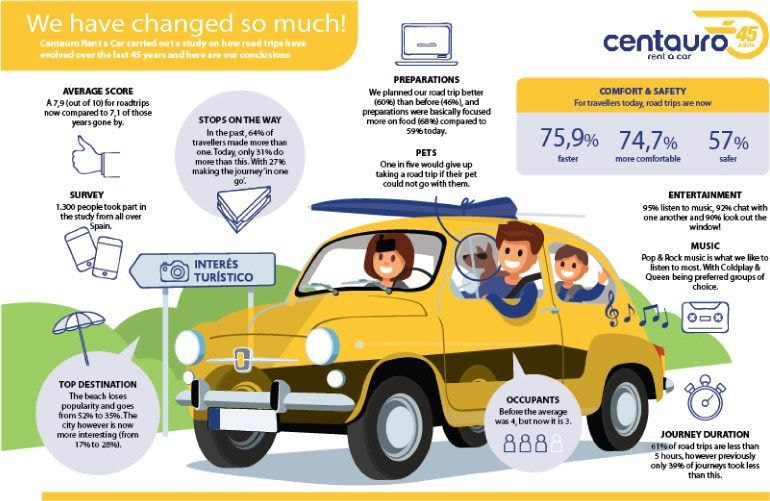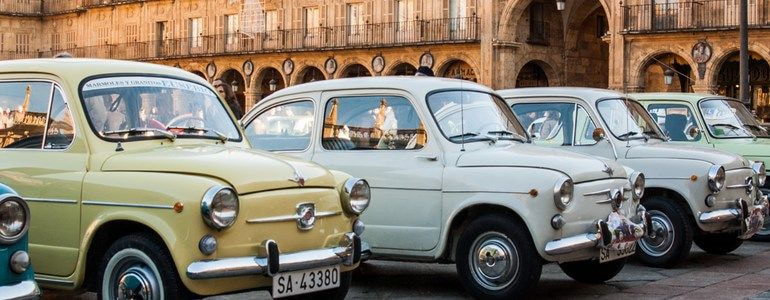These are the road trips of the Spanish: 407 km, less than 5 hours, with few stops and listening to Coldplay
-
Our country’s motorists rate their car trips as 'good' (7.9)
-
Coldplay, Queen, and Fito & Fitipaldis are the bands most heard by Spanish travelers
-
The 'medium' journey has hardly changed in 45 years: it used to be 409 Km, and now is 407 Km
-
Nearly one in three travelers make no stop
-
61% of the “getaways” last less than 5 hours, whereas in 1973 this number dropped to 39%
-
Most respondents believe that today's travelers "do not drive better or are more cautious" than forty-five years ago
-
One in five travelers would give up traveling if they could not bring their pet with them
Centauro Rent a Car has presented the Study on the evolution of road trips over the past 45 years. This report, compiled from 1,300 interviews across Spain, aims to make a 'still picture' of how road trips have evolved since 1973 (when the company was born) until 2018; and collect relevant information about changes in the habits and customs of Spanish drivers.

The report points out that the average number of car passengers is currently three, while 45 years ago it was four. As for the distance covered by road trips, the study shows that the Spanish continue to drive today the same number of kilometers as they did four decades ago. Specifically, today, the average road trip is 407 Km, while 45 years ago it was almost the same: 409 Km. However, the report stresses that car trips are shorter now than before. 61% of the “getaways” last less than 5 hours, whereas in 1973 this number dropped to 39%.
Another important aspect of the study is that the number of breaks taken during road trips has decreased significantly over the years. In the 70s, 64% of travelers took more than one break. Today, only 31% take more than one. And 27% of those surveyed said they make the trip “in one go. ”
The 'dream trip': alone with our partner
For 42% of respondents, the "ideal" trip is with their partner (without children), for 38% with their partner and children. Only a minority (15%) -mainly millennials- believes that their best companions are friends and not their partner. Curiously, pets are considered a family member by most respondents. One in five would give up traveling if they could not bring their pet with them.
Beach is losing followers
Over time, the coast, the seaside, and the mountains remain the preferred destinations of Spanish travelers. But the beach has lost ground as an “ideal destination” in the last 45 years. Specifically, from 52% to 35%; while the travelers’ interest for cities grows (from 17% to 28%). The mountain has also gained prominence: 32%, versus 26% in the past.
At present, the main reasons for the trip are: resting (56%), visiting family/friends (33%) and seeing new places (32%).
Trips: "faster, safer, and more comfortable"
The Spanish rate with an average score of 7.9 (out of 10) their road trips of today, compared to 7.1 in the past. Most people appreciate the evolution in comfort (air conditioning, wider seats…) and vehicle safety. Specifically, they believe that the trips are now faster (75.9%), more comfortable 74.7% and safer (57%). Although, paradoxically, many respondents do not believe that today’s drivers “drive better” or are “more cautious.” They also do not believe that trips today are “more fun” than in the past, despite the new amenities and technology advancements.
We listen to music, chat, and admire the landscape
Presently, the chief entertainments of travelers are: listening to music (95%), chatting with their companions (92%), admiring the landscape (90%) and listening to the radio - news or programs, not music- (84%).
Pop and rock are the music genres most listened to by the Spanish motorists today. As to specific artists, Coldplay, Queen and Fito & Fitipaldis are favorite. Among young people (18-30 years), however, the best music for road trips is electronic, rap/hip-hop, reggaeton or trap.

We sing and play “I spy” with children
The study emphasizes that the “classic” games to entertain children are the same over the years, despite the advent of new technologies. Nowadays, the most common “gadgets” to entertain the kids: playing music (66%), singing 46%, playing “I spy,” “word chains” or other traditional games ( 34%) and watching movies (33%). The report also notes that phones have become one of the gadgets most used by parents.
We are more forward-looking when preparing a trip
Travelers today are more forward-looking than before. Currently, 65% of the Spanish plan their summer trips with more than one month of anticipation. At the other extreme, we find 38% of Spanish who know they will go on a trip this summer but has not prepared anything yet.
As for specific tasks, 60% of respondents planned their journey, 59% prepare food and drink (sandwiches…) for the trip, and 55% seek information about the destination. In the past, only 46% get ready for their trip beforehand, and the activities were more focused on the preparation of food (68%) and planned stops (33%). In this section, we need to point out that the emergence of the Internet - as well as new technologies such as GPS or 4G mobile phones- have been critical factors for the Spanish to prepare more easily many specific aspects of their trips.
About the “Study on the development of road trips in the last 45 years”
The study was prepared by IPSOS, the largest independent market research institute. More than 1,300 interviews were conducted across Spain to gather information on “how the way we travel by car has changed over the last 45 years, from the perspective of today’s travelers (under 58) and the memory of those who were the travelers of the 70s.” This new report is part of the global campaign 'Summer of 73' we are developing to commemorate our 45th Anniversary throughout this year.